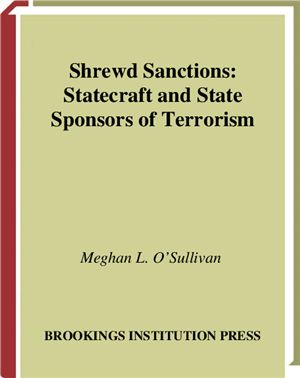Brookings institution press, 2003. 424 p.
Economic Statecraft in American Foreign Policy.
A Map to What Lies Ahead.
Sanctions, Globalization, and American Preeminence.
Post–Cold War Trends in the Use of Sanctions.
Changing U.S. Interests.
Bringing New Actors to the Fore.
Domestic Dynamics in the Making of Foreign Policy.
The Sanctions Debate.
Outstanding Issues to Be Addressed.
Influencing Iran.
The Historical Context of Sanctions.
Judging the Effectiveness and Utility of Sanctions on Iran.
Economic Impact.
Political Impact.
Goals Achieved.
Costs Boe.
Explaining the Record of Sanctions on Iran.
Accounting for the Achievements and Disappointments of Sanctions.
Comparing the Utility of Sanctions to Alteatives.
Looking Ahead.
Inhibiting Iraq.
The Historical Context of Sanctions.
1991–1993 / 1994–1998 / 1998–2002.
Judging the Effectiveness and Utility of Sanctions on Iraq.
Economic Impact.
Political Impact.
Goals Achieved.
Costs Boe.
Explaining the Record of Sanctions on Iraq.
Accounting for the Achievements and Disappointments of Sanctions.
Comparing the Utility of Sanctions to Alteatives.
Looking Ahead.
Limiting Libya.
The Historical Context of Sanctions.
Judging the Effectiveness and Utility of Sanctions on Libya.
Economic Impact.
Political Impact.
Goals Achieved.
Costs Boe.
Explaining the Record of Sanctions on Libya.
Accounting for the Achievements and Disappointments of Sanctions.
Comparing the Utility of Sanctions to Alteatives.
Looking Ahead.
Sanctioning Sudan.
The Historical Context of Sanctions.
Judging the Effectiveness and Utility of Sanctions on Sudan.
Economic Impact.
Political Impact.
Goals Achieved.
Costs Boe.
Explaining the Record of Sanctions on Sudan.
Accounting for the Achievements and Disappointments of Sanctions.
Comparing the Utility of Sanctions to Alteatives.
Looking Ahead.
Shrewd Sanctions:
Economic Tools and U.S. Foreign Policy.
Economic Tools in an Age of Global Terrorism.
The Shrewd Use of Sanctions.
Assessing the Past Record.
Explaining Past Failures.
Toward the Better Use of Sanctions.
Securing Multilateral Sanctions.
Making the Most of Unilateral Sanctions.
Gauging the Political Response of the Target.
Putting Costs in Perspective.
Prioritizing Goals.
Making Sanctions Regimes More Flexible.
The Wise Policymaker.
Economic Statecraft in American Foreign Policy.
A Map to What Lies Ahead.
Sanctions, Globalization, and American Preeminence.
Post–Cold War Trends in the Use of Sanctions.
Changing U.S. Interests.
Bringing New Actors to the Fore.
Domestic Dynamics in the Making of Foreign Policy.
The Sanctions Debate.
Outstanding Issues to Be Addressed.
Influencing Iran.
The Historical Context of Sanctions.
Judging the Effectiveness and Utility of Sanctions on Iran.
Economic Impact.
Political Impact.
Goals Achieved.
Costs Boe.
Explaining the Record of Sanctions on Iran.
Accounting for the Achievements and Disappointments of Sanctions.
Comparing the Utility of Sanctions to Alteatives.
Looking Ahead.
Inhibiting Iraq.
The Historical Context of Sanctions.
1991–1993 / 1994–1998 / 1998–2002.
Judging the Effectiveness and Utility of Sanctions on Iraq.
Economic Impact.
Political Impact.
Goals Achieved.
Costs Boe.
Explaining the Record of Sanctions on Iraq.
Accounting for the Achievements and Disappointments of Sanctions.
Comparing the Utility of Sanctions to Alteatives.
Looking Ahead.
Limiting Libya.
The Historical Context of Sanctions.
Judging the Effectiveness and Utility of Sanctions on Libya.
Economic Impact.
Political Impact.
Goals Achieved.
Costs Boe.
Explaining the Record of Sanctions on Libya.
Accounting for the Achievements and Disappointments of Sanctions.
Comparing the Utility of Sanctions to Alteatives.
Looking Ahead.
Sanctioning Sudan.
The Historical Context of Sanctions.
Judging the Effectiveness and Utility of Sanctions on Sudan.
Economic Impact.
Political Impact.
Goals Achieved.
Costs Boe.
Explaining the Record of Sanctions on Sudan.
Accounting for the Achievements and Disappointments of Sanctions.
Comparing the Utility of Sanctions to Alteatives.
Looking Ahead.
Shrewd Sanctions:
Economic Tools and U.S. Foreign Policy.
Economic Tools in an Age of Global Terrorism.
The Shrewd Use of Sanctions.
Assessing the Past Record.
Explaining Past Failures.
Toward the Better Use of Sanctions.
Securing Multilateral Sanctions.
Making the Most of Unilateral Sanctions.
Gauging the Political Response of the Target.
Putting Costs in Perspective.
Prioritizing Goals.
Making Sanctions Regimes More Flexible.
The Wise Policymaker.

